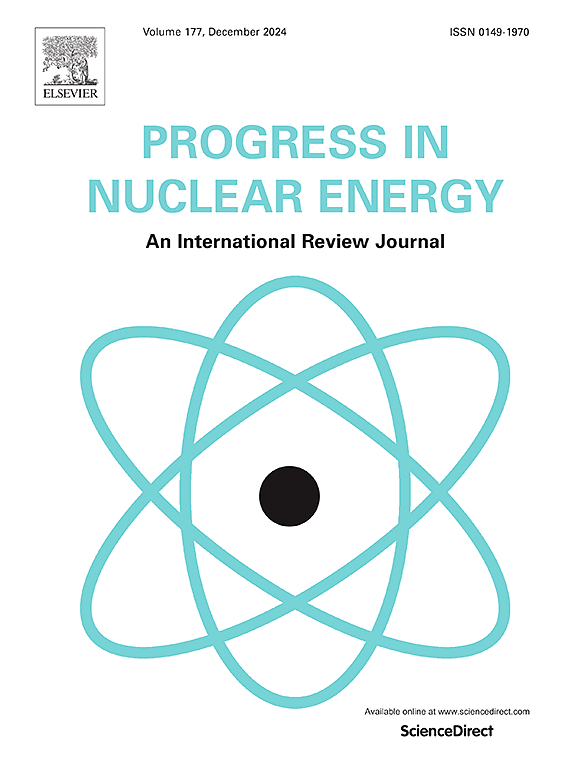Thermal-hydraulic analysis of helical coil once-through steam generators under complex oceanic conditions
IF 3.3
3区 工程技术
Q1 NUCLEAR SCIENCE & TECHNOLOGY
引用次数: 0
Abstract
The helical coil once-through steam generator (HCOTSG) possesses several advantages, including excellent thermal efficiency, compact size, rapid start-up, and low energy consumption. These qualities make it particularly well-suited for use in ship reactors. This paper introduces a one-dimensional thermal-hydraulic calculation program for helical coil once-through steam generators (HCOTSGs) operating under complex oceanic conditions, utilizing the finite difference method alongside fixed boundary conditions and staggered grid techniques. By incorporating the heat transfer and friction relations to the helical coil, as well as considering the geometric structure of the helical coil when incorporating ocean conditions, the characteristics of the helical coil are reflected in the one-dimensional code. The impact of oceanic conditions is considered by modifying the momentum equation. This paper considers highly complex oceanic conditions that involve a coupling of inclining and oscillation. Furthermore, the accuracy of the developed program is verified by comparing the HCOTSG design parameters of the MRX reactor with the calculated values from internationally recognized prediction programs against the findings presented here.
复杂海洋条件下螺旋线圈直通式蒸汽发生器的热工水力分析
螺旋盘管直通式蒸汽发生器(HCOTSG)具有多个优点,包括热效率高、体积小、启动快和能耗低。这些优点使其特别适合用于船用反应堆。本文采用有限差分法、固定边界条件和交错网格技术,介绍了在复杂海洋条件下运行的螺旋线圈直通式蒸汽发生器(HCOTSG)的一维热工水力计算程序。通过将传热和摩擦关系纳入螺旋线圈,以及在纳入海洋条件时考虑螺旋线圈的几何结构,螺旋线圈的特性在一维代码中得到了反映。通过修改动量方程来考虑海洋条件的影响。本文考虑了涉及倾斜和振荡耦合的高度复杂的海洋条件。此外,通过将 MRX 反应堆的 HCOTSG 设计参数与国际公认的预测程序的计算值进行比较,验证了所开发程序的准确性。
本文章由计算机程序翻译,如有差异,请以英文原文为准。
求助全文
约1分钟内获得全文
求助全文
来源期刊

Progress in Nuclear Energy
工程技术-核科学技术
CiteScore
5.30
自引率
14.80%
发文量
331
审稿时长
3.5 months
期刊介绍:
Progress in Nuclear Energy is an international review journal covering all aspects of nuclear science and engineering. In keeping with the maturity of nuclear power, articles on safety, siting and environmental problems are encouraged, as are those associated with economics and fuel management. However, basic physics and engineering will remain an important aspect of the editorial policy. Articles published are either of a review nature or present new material in more depth. They are aimed at researchers and technically-oriented managers working in the nuclear energy field.
Please note the following:
1) PNE seeks high quality research papers which are medium to long in length. Short research papers should be submitted to the journal Annals in Nuclear Energy.
2) PNE reserves the right to reject papers which are based solely on routine application of computer codes used to produce reactor designs or explain existing reactor phenomena. Such papers, although worthy, are best left as laboratory reports whereas Progress in Nuclear Energy seeks papers of originality, which are archival in nature, in the fields of mathematical and experimental nuclear technology, including fission, fusion (blanket physics, radiation damage), safety, materials aspects, economics, etc.
3) Review papers, which may occasionally be invited, are particularly sought by the journal in these fields.
 求助内容:
求助内容: 应助结果提醒方式:
应助结果提醒方式:


